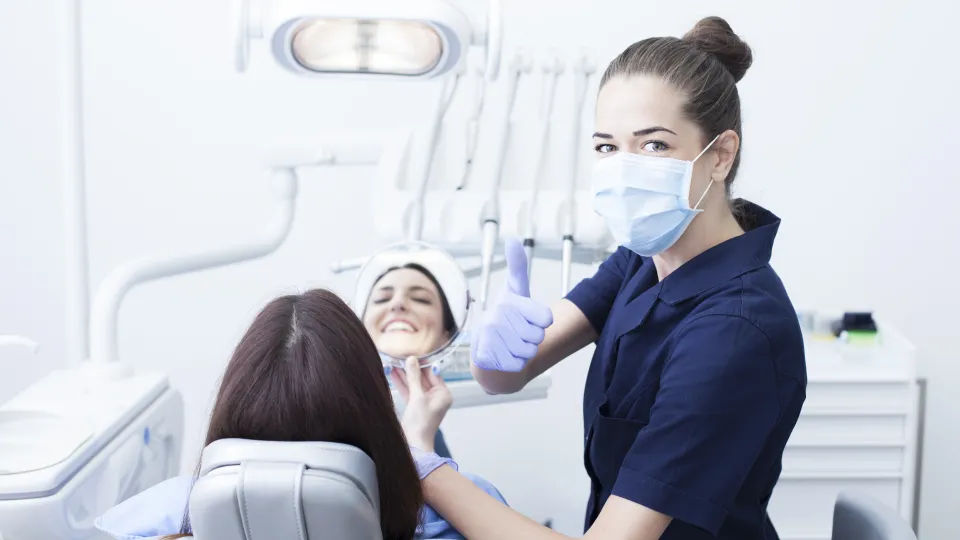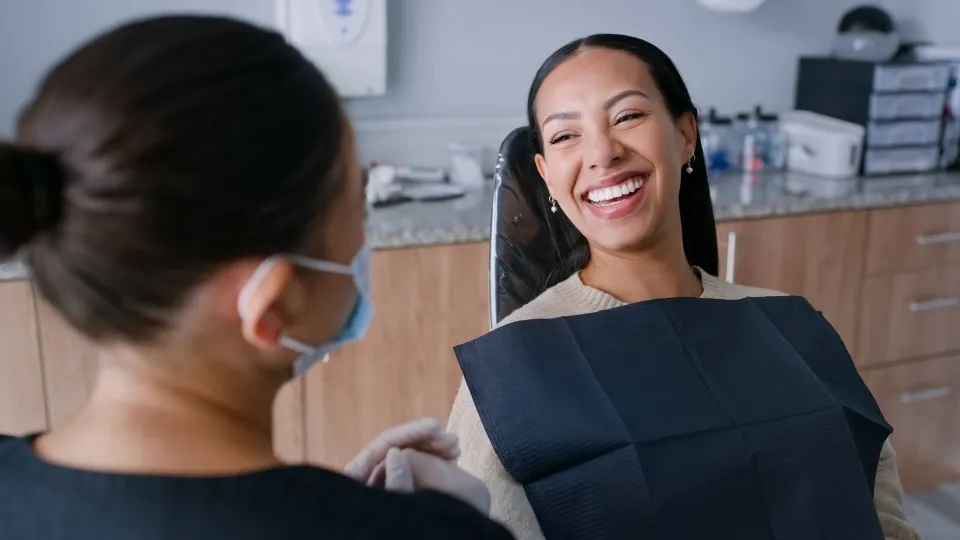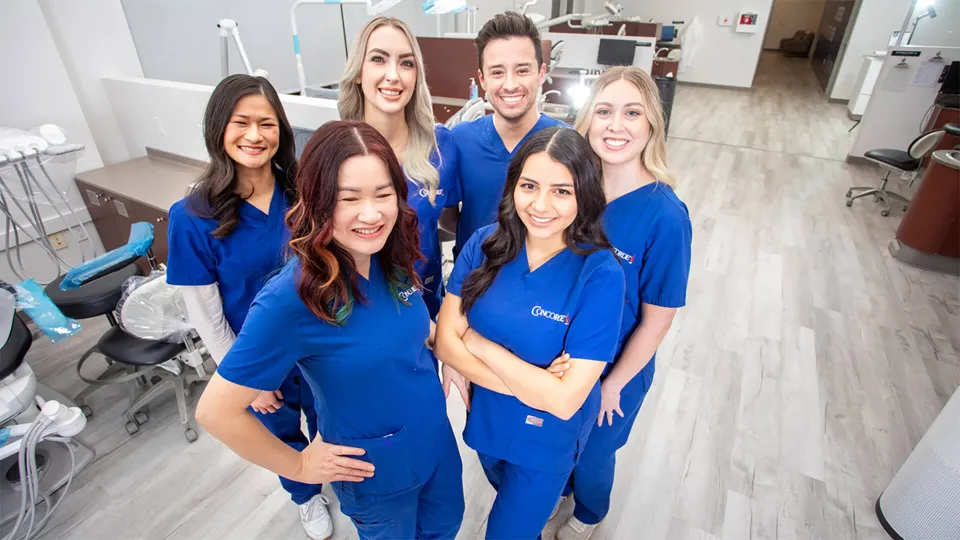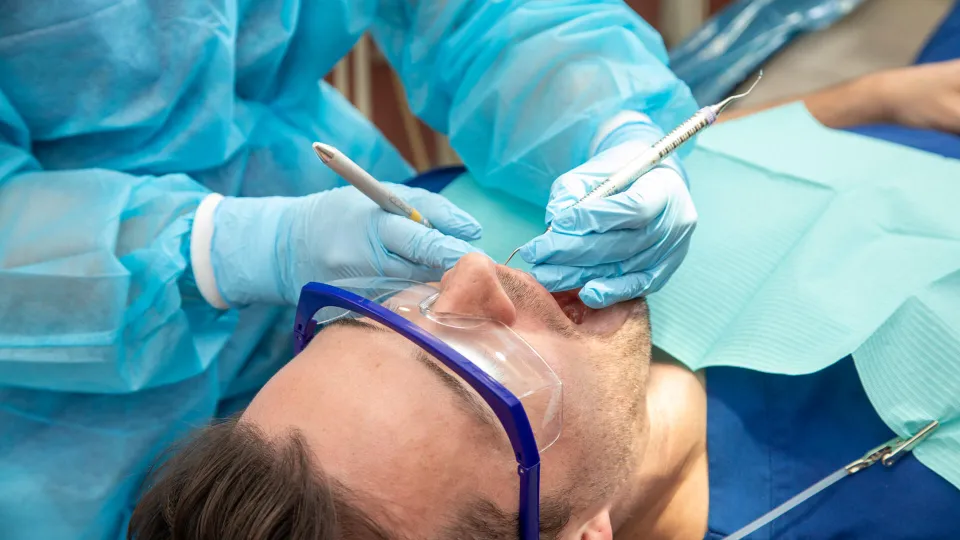
Before pursuing a career in the dental industry, it's important to learn about a day as a dental hygienist. This professional typically works at a dentist's office and performs procedures to maximize the health of patients' teeth and gums. A dental hygienist can also work in a physician's office or for a government health care program. They build relationships with patients to learn about the oral habits they practice at home and ensure that patients understand how to take care of their mouths properly.
As a member of the health care team, the hygienist also interacts with dentists and oral surgeons to discuss symptoms of dental conditions, interpret the findings of diagnostic tests, and administer local anesthesia. Additionally, the profession is growing: the U.S. Bureau of Labor Statistics projects an 11% increase in dental hygienist job openings between 2020 and 2030, which is faster than the average rate of growth for other professions in that time period
(1). The typical working day as a dental hygienist includes diverse job duties on a flexible schedule.
Patient Interviews
When patients come to the dentist's office for cleanings, the dental hygienist conducts interviews before delivering treatment. The purpose of these conversations is to learn about the patients' oral histories, which determines what dental treatment they may need now and in the future. It's also the hygienist's responsibility to share the patients' responses with the dentist.
During the conversation, the hygienist can address any concerns the patients may have about their oral health and clarify the steps of the cleaning procedure to make the patients feel more comfortable. This professional often interacts with patients of all ages, from young children to older adults, so it can be important for them to communicate in ways the patients understand. The interview is an opportunity for the hygienist to connect with the patients, which may encourage them to be forthcoming about their hygiene habits.
Here are examples of pre-cleaning questions the hygienist may ask:
- How many times a day do you brush your teeth?
- Do you use a manual or an electric toothbrush?
- What kind of toothpaste do you use?
- How often do you floss?
- What type of floss do you use?
- Do your gums bleed when you brush or floss?
- Are you experiencing any pain or discomfort with your teeth?
- Do you drink alcohol, chew tobacco, or vape?
Teeth Cleaning
Teeth cleaning is a common responsibility in a typical day as a dental hygienist. Using special tools such as a scaler, the hygienist removes plaque and tartar that have accumulated on the patient's teeth and gums. For a thorough cleaning, the hygienist uses a mirror to see the surfaces in the mouth to make sure all the bacteria is gone. The cleaning is detailed but gentle, prioritizing the patient's comfort while treating the teeth and gums.
After using the scaler, the hygienist flosses between the patient's teeth to extract the remaining particles. Some areas of the mouth, such as the back molars, can be challenging for patients to reach on their own. The professional cleaning from the dental hygienist can extend to the entire mouth, helping patients achieve healthier smiles. Other steps of the cleaning process include polishing to reduce stains on the enamel and teeth whitening.
Diagnostic and Preventive Care Procedures
Another common aspect in a day as a dental hygienist is a diagnostic procedure. Before developing a treatment plan, the dentist may need X-rays of the patient's mouths to gain a better understanding of the position of their teeth and the health of their gums. The hygienist places shields on the patient, which protect them from radiation exposure, and uses the X-ray machine to capture images of the inside of their mouth. The hygienist may direct the patient to relax their tongue and bite down on objects during the testing.
A preventive care procedure helps restore the patient's oral health so that they can avoid dental issues. For example, to prevent cavities in pediatric patients, the hygienist places sealants and fluoride on the teeth, which can also strengthen enamel. Every activity that takes place during the hygiene appointment earns an entry in the patient's dental health record,
helping the hygienist and dentist keep track of each patient's oral history while they monitor progress in their treatment plans.
Patient Education
During the day as a dental hygienist, often at the end of the hygiene appointment, the professional initiates another conversation to educate patients about caring for their teeth. They recommend oral products to use to strengthen tooth enamel, maintain cleanliness in the mouth, and whiten the teeth. The patients learn which brands of toothpaste, mouthwash, and floss are best suited for their mouths
With demonstrations, the hygienist also shows patients how to brush and floss properly, making sure they're removing food particles from their mouth and reducing the accumulation of plaque and tartar. The purpose of patient education is to emphasize healthy oral habits that can also decrease the likelihood of developing dental conditions such as gum disease.
Room Maintenance
When not seeing patients or speaking with the dentist, the dental hygienist is organizing patient rooms before, between, and after appointments. Organization can include restocking supplies, disinfecting cleaning equipment, and replacing tools. This helps dental hygienists prepare for their appointments and deliver prompt treatment to patients. At the start of the day, the hygienist may also review the schedule of patients to understand what's in store and prepare the room accordingly. For example, if all patients are receiving routine cleanings, then the hygienist will make sure they have enough floss in the room.
Start Your Education for a Career as a Dental Hygienist
At Concorde, an aspiring dental hygienist can complete the coursework for an associate’s degree in as little as 18 months, depending on the campus location. There are multiple Concorde associate degree programs for dental hygiene across the country, where students can have the opportunity to learn and practice how to perform teeth cleanings, operate X-ray machines, and teach healthy oral habits to patients. Reach out to Concorde today to learn more about the programs and explore financial aid services and scholarship opportunities, for those who qualify.
Interested In How To Become a Dental Hygienist?
Click here to explore a Concorde Dental Hygiene Program near you!
Take The Next Step Towards a Brighter Future
Interested in learning more about our Dental Hygiene program?
We have a Concorde representative ready to talk about what matters most to you. Get answers about start dates, curriculum, financial aid, scholarships and more!







